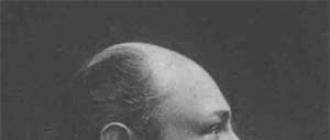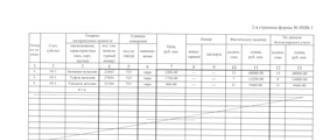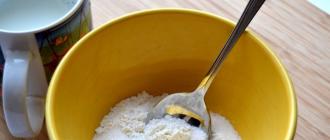Spelling N and NN in adjectives
The number of letters N in adjectives depends on the suffix used to form the word.
If a word is formed using the suffix -N-, doubling of consonants is obtained only if the stem of the generating word ends in N. For example: SLEEP-N-YY, DRUM-N-YY.
If suffixes were used to form a word
–AN-, -YAN-, -IN-, then you need to write one letter N. For example: GUS-IN-Y, SILVER-YAN-Y, LEATHER-AN-Y.
If the suffixes are -ONN- or -ENN-, then two N are written. For example: AVIATION-ONN-YY, SOLOM-ENN-YY.
Remember a few exceptions: GLASS, TIN, WOODEN. These words are written with double N, despite the fact that they were formed using the suffix –YAN-.
Note also the word WINDY. It does not contain double consonants, since this adjective was formed not from the noun WIND, but from the obsolete verb VETRETI with the help of the suffix N.
There are also several adjectives for which this rule cannot be applied, for example: YOUNG, RUSH. The fact is that these words were formed without suffixes at all. They contain one H, which is at the root.
Exercise
1. From below came a growing, rising rumble, from the side - the knocking of bone balls through a glass partition, behind which alarmed faces flashed. (M. Bulgakov “Diaboliada”)
2. Just think: forty kopecks from two dishes, and both of these dishes and five alts are not worth much, because the supply manager stole the remaining twenty-five kopecks. (M. Bulgakov “Heart of a Dog”)
3. Then the bloody sun exploded in his head with a ringing sound, and he saw absolutely nothing else. (M. Bulgakov “Diaboliada”)
4. Duck Nose turned pale, and Turbin immediately realized that he had made a mistake and had grabbed the wrong person. (M. Bulgakov “The White Guard”)
5. The machine, having turned the first stagnant waves, went smoothly, with a thousand-headed, lion's roar and ringing, filling the empty halls of Spimat. (M. Bulgakov “Diaboliada”)
6. Looking around the position with his eagle gaze, Korotkov hesitated for a moment and with a battle cry: “Forward!” - ran into the billiard room. (M. Bulgakov “Diaboliada”)
7. But the woman remained adamant and sad. (M. Bulgakov “Diaboliada”)
8. He himself, in the same bandage, but not wetted, but dry, walked around not far from the group of executioners, without even removing the false silver lion muzzles from his shirt, without removing his greaves, sword and knife. (M. Bulgakov “The Master and Margarita”)
9. Then he looked in horror at the razor mirror, sure that he had lost an eye. (M. Bulgakov “Diaboliada”)
10. The long john rose with a strange, unnatural speed, and Korotkov’s heart sank at the thought that he would miss him. (M. Bulgakov “Diaboliada”)
11. The man, smiling an unusually polite, lifeless, plaster smile, approached Korotkov. (M. Bulgakov “Diaboliada”)
12. Korotkov tried to artificially laugh, but it didn’t work out for him. (M. Bulgakov “Diaboliada”)
13. With a shiny penknife, he cut the bell wire... (M. Bulgakov “Heart of a Dog”)
14. The government official is driving the car in vain! – the cat also lied, chewing a mushroom. (M. Bulgakov “The Master and Margarita”)
15. Then he hung the heavy Mauser in a wooden holster, shaking the stand with deer antlers. (M. Bulgakov “The White Guard”)
16. I saw blurry clumps of virgin and untouched lilacs, under the snow, a door, a glass lantern of an old hallway covered with snow. (M. Bulgakov “The White Guard”)
17. The ruddy, fat cadet slammed his stock next to the box and stood motionless. (M. Bulgakov “The White Guard”)
18. ...the holster, probably due to absentmindedness unusual for Colonel Malyshev, was unfastened. (M. Bulgakov “The White Guard”)
19. The rifle rolled with a thud along the icy hump of the sidewalk. (M. Bulgakov “The White Guard”)
20. A strange drunken ecstasy rose from somewhere in Nikolka’s stomach, and her mouth immediately went dry. (M. Bulgakov “The White Guard”)
21. A wise animal instinct grows to replace a very weak and, in really difficult cases, unnecessary mind. (M. Bulgakov “The White Guard”)
22. The jack of hearts climbed onto a chair, spat in Vasilisa’s mustache and fired at point-blank range. (M. Bulgakov “The White Guard”)
23. ... flashed on his hat a golden-gallon tail and the ends of two rifles. (M. Bulgakov “The White Guard”)
24. One only illuminated place: the black cast-iron Vladimir has been standing on a terrible heavy pedestal for a hundred years and holds in his hand, upright, a three-fat cross. (M. Bulgakov “The White Guard”)
25. He was wearing a leather jacket from someone else’s shoulder, worn leather pants and English high boots with laces to the knees. (M. Bulgakov “Heart of a Dog”)
26. And if you want to listen to good advice: pour not English, but ordinary Russian vodka. (M. Bulgakov “Heart of a Dog”)
27. The doctor, pale, with very determined eyes, raised his glass with a dragonfly waist. (M. Bulgakov “Heart of a Dog”)
28. Philip Philipovich sadly pointed with both hands at the window curtain. (M. Bulgakov “Heart of a Dog”)
29. On the side of the most magnificent jacket, like an eye, a precious stone stuck out. (M. Bulgakov “Heart of a Dog”)
30. The blizzard flapped a gun over his head, threw up the huge letters of the canvas poster... (M. Bulgakov “Heart of a Dog”)
31. Complete amazement was expressed on their faces, and the woman became covered with a cranberry coating. (M. Bulgakov “Heart of a Dog”)
32. He fell straight onto the table into a long dish, splitting it lengthwise... (M. Bulgakov “Heart of a Dog”)
33. Here, in the state library, authentic manuscripts of the warlock Herbert of Avrilak, the tenth century, were discovered, and so I need to sort them out. I am the only specialist in the world. (M. Bulgakov “The Master and Margarita”)
34. The novelist Petrakov-Sukhovey, who was dining at the next table with his wife, who was finishing a pork escalope, with the observation characteristic of all writers, noticed the advances of Archibald Archibaldovich and was very surprised. (M. Bulgakov “The Master and Margarita”)
35. He looked higher and saw a figure in a scarlet military robe rising to the execution site. (M. Bulgakov “The Master and Margarita”)
36. But the fact is that all the time, more and more new material was constantly entering the sleepless floor. (M. Bulgakov “The Master and Margarita”).
The exercise was prepared by R. Lozovsky and B. A. Panov (“League of Schools”).
In adjectives, one letter N is written in suffixes -IN-, -AN-, -YAN-.
For example: swan(in the suffix -IN - one letter N is written) leather(in the suffix
-AN- one letter N is written) woolen(in the suffix -YANG- one letter N is written).
It is very easy to remember three suffixes in which one letter N is written. Need to know the first letter of the alphabet and the last - A and Z. We add one letter N to them and get suffixes - AN, IN, YAN .
You can learn a rhyme that will help you remember the suffixes of adjectives that are written with one letter N.
For adjectives long ago
Recorded in learned books,
When AN, IN, YAN, then N one
And no more surplus.
Suffix -IN- called “animal”. With the help suffix IN adjectives are formed from animate nouns, denoting animals, insects, birds.
MOUSE IN Y = MOUSE + IN
MOSQUITO IN YY = MOSQUITO + IN
NIGHTINGALE IN YY = NIGHTINGALE + IN
In adjectives MOUSE IN OH,MOSQUITO IN OH, NIGHTINGALE IN YY the “animal” suffix is written - IN - with one letter N.
Suffixes - AN-, -YAN - written in adjectives denoting the material from which the object is made:
SKIN AN SKIN = SKIN + AN
SAND ANІ= SAND + AN
SILVER YANG YY = SILVER + YANG
WOOL YANG OH= WOOL + YANG
GLIN YANG Y = CLAY + YANG
Adjectives SKIN AN OH, SAND AN OH, SILVER YANG YY , WOOL YANG OH, GLIN YANGІY are written with one letter Н, since the suffix in them begins with the letters A, I .
You should remember three adjectives whose suffix begins with the letter Y, but the letters N are written in it not one, but two. These are the exception words: TREE YANN OH, TIN YANN OH, GLASS YANN YY.
The following riddle about WINDOW:
glass surface, wooden frame, pewter handle.
2. Two letters НН in adjective suffixes
Two letters N are written in adjectives whose suffixes begin with the letter O or E. For example, EDITORS UNN OH, TRADITION UNN OH, STRAW ENN OH, CRANK ENN YY.
Remember suffix - ONN- helps with NV UN - United Nations.
It is known that suffix - UNN- - UN fan.
It strives to be as similar to the UN as possible in everything. True, the difference between them is immediately noticeable: the suffix - ONN- two letters H, and his UN idol has two letters O.
Using the suffix - UNN -, in which two letters N are written, adjectives are most often formed foreign language origin. For example, COMMISSION UNN OH, EDITORIAL UNN OH, TRADITION UNN OH, REVOLUTION UNN YY
Two letters N are written in the suffix -ENN-.
Adjectives with the suffix - ENN- most often formed from nouns whose stem ends in several consonants: ARTS ENN OH, CRANK ENN OH, LIFE ENN OH, OGN ENN OH, SICK ENN YY.
There is an exception word in the Russian language, the suffix of which begins with the letter E, but the letters N are written in it not two, but one. This word is WINDY.
WINDY DAY
WINDY YOUTH
The word WINDY contains only one letter N!
However, if the prefix WITHOUT appears in the word WINDY, then according to the rule two letters N are written.
WINDLESS NIGHT (the word has a prefix)
Remember the spelling of words WINDY andWINDLESS The following poem helps.
Windy young man, windy day!
You can easily remember:
I always write only one N!
Windless morning, day or night!
Without applying the rules of knowledge,
Write two N without hesitation!
3. Two letters H at the junction of morphemes
Two letters N are written in adjective names formed using the suffix N from nouns with a stem starting with the letter N.
PLAIN = PLAINS N A+ N
LONG= DURATION N A+ N
TRUE= TRUE N A+ N
OUTSTANDING= DIKOVI N A+ N
PANCAKE = BLI N +N
The following poetic rule helps to write in an adjective double letter N.
Fog one has N,
But if the city became foggy,
Based on N and suffix N,
And it turns out NN,
Remember this case is strange.
4. Something to remember
There are several words in the Russian language that do not have the suffix N and suffer greatly from this. These words are often confused and the double NN is mistakenly written in them.
Remember: in words SINGLE, GREEN, SPICY, RUSH, YOUNG, PORK one letter N is written, which is part of the root.
5. Analyzing examples
Let's determine how many letters N are written in the following adjectives and why.
GUSINY(this word has an “animal” suffix -IN -, in which one letter N is written),
TELEPHONE(this adjective is formed from the noun TELEPHONE, the stem of which ends in the letter N. The suffix N is added. Therefore, we write the word TELEPHONE with two letters N),
STRAW(the suffix of this adjective begins with the letter E, so we write НН),
LINEN(the suffix of this adjective begins with the letter I and denotes the material from which the object is made, so we write one letter N),
WINDY(this is an exception word in which one letter N is written),
INFECTIOUS(the suffix of this adjective begins with the letter O, so we write НН),
GLASS(this is an exception word that is included in the riddle about the window; therefore we write NN).
6. Algorithm for writing N, NN in adjective suffixes
When choosing N, NN for writing in the suffix, you can use the algorithm.
Table 1. Algorithm for writing N, NN in adjective suffixes ()
7. N, NN in short adjectives
It should be remembered that in short names The same number of adjectives are written N as in full ones: traditional is traditional, smart is smart.
References
- Russian language. 6th grade / Baranov M.T. and others - M.: Education, 2008.
- Babaytseva V.V., Chesnokova L.D. Russian language. Theory. 5-9 grades - M.: Bustard, 2008.
- Russian language. 6th grade / Ed. MM. Razumovskaya, P.A. Lekanta. - M.: Bustard, 2010.
- ReferenceTable().
- Presentation ().
- Additional exercise ().
Homework
Task No. 1
Insert the missing letters Н or НН where necessary. Justify your answer.
Yu..y, yu..at, silver..y, aviation..y, long..yy, tin..yy, straight..yy, hurricane..yy, debatable..yy, swan..yy, wind..y, windy..oh, windless..yy, axy..yy, morning..yy, morning..ik, glassy..yy, toiler..yy, silver..yy, silver..ka, silverless..ik, family..oh, ice..oh, cranberry..oh, hemp..y, hemp..ik, sparrow..y, nightingale..oh, stirrup..oh, family..oh, Red Banner..yy, solemn..yy, vital..yy, old..yy, guest..aya, guest..itsa, butter..yy, butter..itsa, wind..itsa, va..aya, ple..y, whole..y, drunk..yy, zealous..yy, ruddy..yy, ruddy..yy, fiery..yy, sandy..yy, craft..yy, secondary..yy, retired..y, clay..yy, beastly..yy, progeny..yy, precious..yy, bully..yy, flat..yy, half-dead..yy, wild..yy, powerful..yy, sheep..y, infectious..y, sympathetic..yy, seven-lined..yy, countless..yy, friendly..yy, oaty..yy, simultaneous..yy, ants..yy, car..yy, mouse..y, pig..oh, pig..a, firewood..ik, oil..ik, mal..ik, os..ik, ripple..ik, friend..ik, moshe..ik, windy..ik, side..ik, smart..y, ko..itsa, lee..yy, sandy..ik, travel..ik, vlasya..itsa, vish..ik, weathered..yy, kure..oh (ataman).
Task No. 2
Make the “silent” table speak: write down the necessary words in place of the gaps. Write out adjectives with the studied spelling from the poems.
1. He slept, all shining, in an oak manger,
Like a ray of moonlight in the hollow of a hollow.
They replaced him with a sheep's skin
Donkey lips and nostrils of an ox.
B. Pasternak
2. And the birch tree stands in so... silence,
And snowflakes burn in golden fire.
S. Yesenin
3. Do you love ice...oh January,
No wind, brutal cold.
And I am fierce February,
Blizzard, defiant drifting snow.
Teacher's comments on the material being studied
| Possible difficulties | Good advice |
| It's hard to remember the exceptions to the rule. | Refer to Appendix 1.2 and fill in the gaps in the words where necessary. |
| Sometimes it can be difficult to understand from which noun a given adjective is formed: moral; mysterious; scarlet; own; natural; spicy; indirect; original; humane; immune, etc. | Most likely, these are adjectives formed from obsolete nouns. You can apply the rule to them in in full(even if their former suffixes no longer stand out from a modern point of view): moral; mysterious; scarlet; own; natural; indirect lawsuit-ONN-th. Special attention pay attention to the words human-N-y and immuN-N-y, which are formed not from nouns, but from the international bases – human- and –immune- using the suffix –n-. |
| What to do with words like old..., were..., purposeful, deep..., true..., remarkable, etc.? They have the suffix -in-. Should they be written with one H? | In such words, the suffix –in- is already included in the basis of the nouns from which these adjectives were formed. It becomes part of the stem of the noun, and it is to it that the adjective suffix -n- is added. Therefore, NN is written in such words. Starin (a) - old-n-th. Bylin (a) - epic -n-th. Virgin (a) - virgin soil. Depth(s) - depth-n-th. Truth (a) - true. Dozen(s) - not a dozen. |
| Sometimes it is unclear which suffix is used in a given adjective: -an- (-yan-) or –enn-. Straw... Clay... Silver. Cutaneous. Windy. | In this case, the suffix should be remembered. Pay attention to the spelling of the following words. Straw. Clay. Silver. Windy day, man (remember also: wind engine). oil (paints). When deciding this issue, also use the following considerations. Words with the suffix –AN- (-YAN-) indicate from which ( silver) or for what ( wood-burning) the item is made. cranberry, fiery, pumpkin, straw. |
| Are there cases when the exceptions forged, chewed and wounded are written using NN? | Exceptions: forged, chewed and wounded can be written with two Hs when they have dependent words or prefixes. A sword forged by a gunsmith (gunsmith is a dependent word). A soldier wounded in the shoulder (in the shoulder is a dependent word). SHACKED HANDS (prefix C-). Wounded finger (PO- prefix). |
| In some cases, it is difficult to understand which type of verb the word is formed from. Decisive (formed from decide? decide?). Abandoned (formed from throw? throw?). This leads to spelling errors. | If you have a choice between perfective and imperfective verbs, choose the perfective verb. Decided - formed from decide (sov.v), written NN. Abandoned - formed from throw (soviet), written NN. |
| How many N are written in words with several roots: raw smoked; quick-frozen and under.? | The presence of two roots in itself is not a condition for double H. Freshly frozen. Raw smoked. In order for two Hs to appear in the suffix of such words, one of the conditions noted in the rule must be triggered. Freshly cut (prefix C- before the root -KOSH-). Quick-frozen (the prefix ZA- before the root -ICE-CREAM-). Distinguish between words like lightly wounded and lightly wounded. In the first case we have before us compound word(medical term), in which there are no conditions for NN, in the second case there is a dependent word that requires writing NN. |
| How many N are written in short participles? The meeting is over...but. The mine is neutralized...on. | In short participles, one letter N is written, regardless of whether they contain prefixes, dependent words, etc. The meeting is over. The mine has been neutralized. |
Н and НН in adjectives formed from nouns
The choice of N or NN in adjectives formed from nouns is determined by which word and with the help of which suffix the adjective was formed.
Rat poison; living room; remarkable nature.
Find out from which noun the word is formed.
| Write NN | |
| If one H is at the base of a noun, and the second H is a suffix of an adjective: - | If you see the suffix -IN-: |
| If you have suffixes -ENN- / -ONN-: foliage(s) - - station(s) - - Exceptions: windy but: without windy under windy | If you have suffixes -AN- / -YAN-: silver) - - leather) - - Remember: glass tin wooden constant nameless |
The rule also applies to short adjectives (road).
Rat poison - rat(s) + .
Living room - guest + .
Remarkable nature - ![]() .
.
N and NN in full verbal adjectives and participles
Dried laundry; crazy speed; sold product.
In full verbal adjectives and participles, NN is written when any of the conditions noted below are present.
Writing conditions NN:
3) the word contains -OVA- / -EVA-:
Exceptions:
4) the word is formed from a perfect verb (question what to do?):
settled matter ( decide- owls V.).
Exception:
Н and НН in short verbal adjectives and short participles
She is modest and well-mannered...a; she was brought up in a boarding school; she is always collected..and organized..and.
She is modest and well-mannered - this is a short verbal adjective.
She was raised in a boarding school - this is a short communion.
She is always collected and organized - these are short verbal adjectives.
Adjectives:
1) Adjectives with suffixes -an-, -yang-, -in- are written with one -n-: clay, silver, chicken. Exceptions: glass, tin, wood.
2) Adjectives with suffixes -onn-, -enn- written with two -n-: aviation, related.Exception : windy, oily.
3) In adjectives formed from the stem on -n using a suffix -n-, spelled two -n-:picturen -a + n th).
Participles and adjectives formed from verbs:
Two letters -n- written in suffixes full participles and adjectives formed from verbs:
1) if they have the prefix: everything is plowed, from boiled(But: with a mental boy, called brother);
2) if they have dependent words: Varennaya with milk;
3) if the word has suffixes -ova-, -eva-, -irova-: pickled, paved;
4) if the word is formed from an unprefixed verb of the perfect form (except wounded):deprived;
In short participles one is written -n-, and in adjectives - two (except for the form singular masculine). It is necessary to distinguish between full and short forms of passive past participles with suffixes -enn- And -nn- and adjectives formed from verbs. Compare:
well-mannered participle from the verb “to educate”; short form: brought up, brought up a, brought up o, brought up s And well-mannered adjective; short form: brought up, brought up, brought up, brought up.
How to distinguish? It makes sense, but it’s easier to try to substitute short form word ' more’:Masha was raised by her grandmother And Masha is well-mannered, polite and smart. As you can see, in the first case the substitution of the proposed word is inappropriate, but in the second it is quite possible. In addition, passive participles require the presence (at least on a subconscious level) of an indication of who performed the action indicated in the participle.
Writing one or two letters -n- V complex adjectives obeys the general rule: plain painted (paint, imperfect appearance); smoothly colored (painted, perfect appearance).
Adverbs, formed from adjectives with two -n-, also written with two -n-: were organized.
In nouns, formed from adjectives, participles and verbal adjectives, so many are written -n-, how many of them were in the production base: pupil ( from ‘ well-mannered’), martyr ( from ‘ tormented’) .
Two - n- written in all words formed from stems to -n, with a suffix starting with -n:foam (pen -a+n -y), hexagon (six+sided b+n ik).
Assignments.
His manners were not simple, but rather sophisticated. In the labyrinth of crooked, narrow and feeble streets, people were always sneaking around. The drivers argued with the loaders that the car was underloaded (3).
Manners are (what?) sophistication(1). This is a short adjective because it can be replaced by the full form exquisite. Determining the spelling full form: exquisite ... is formed from the verb find, which has the prefix from-. Thus, we write two NNs in both full and short form. Weak(2)th (which?) streets. This is a full adjective formed from the imperfect verb to pave. The prefix ne- does not affect the spelling, there are no suffixes -OVA/-EVA, and there are no dependent words either. We write one N. The car is underloaded (3) (what has been done?). This is a short participle, as it can be replaced with the verb underloaded. In short participles one N is written. Thus, correct option- answer No. 4.
Which answer option correctly indicates all the numbers in whose place NN is written?
The house stood somewhat away from the forest; its walls here and there were renovated (1) with fresh wood, the windows were painted (2) white, a small porch on the side, decorated (3) with carvings, still smelled of resin.
In the foreground of the picture, against the background of figures of mummers with (2) sooty faces, a girlish figure in a snow-white dress with braided (3) sleeves stands out clearly.
Which answer option correctly indicates all the numbers replaced by one letter N?
In the painting “Kermessa,” Rubens depicted a crowd of heated (1) townspeople, desperately (2) dancing a frenzied (3) dance.
1. With one letter n are written:
1). Adjectives with a non-derivative base: red, young, blue. There is no suffix in such adjectives. The letter n is part of the root.
2). Denominate adjectives with the suffix -n: winter (from: winter), summer (from: summer).
3). Denominate adjectives with the suffixes -an, -yan: sandy, silver (adj. meaning “name of material, substance”), and -in: mouse, sparrow (adj. meaning “accessories”).
Exception:
wooden, tin, glass write with two letters nn.
4). Verbal adjectives, if there is no prefix and explanatory word: fried meat.
Exception:
Write with two letters nn words from the list:
given, arrogant, abandoned, desired, bought, seen, made, cutesied, captivated, deprived, sacred, read, desperate, minted, cursed, unheard of, unseen, unexpected, unforeseen
Don't be confused!
The list of exceptions does not include words uninvited, uninvited, named, which are consistent with the data above. Write them according to the rule: unsolicited advice, uninvited guest,sworn brother.
5). Short adjectives in the masculine singular form: advice is valuable - (m.r.), as well as short adjectives in all other forms if they are formed from full adjectives with one letter n: red girl (from the full form with one letter n: red), the sun is red, the girls are red.
7). Adverbs ending in -o and -e, formed from adjectives with one letter n: windy, neat.
2. With two letters nn are written:
1). Denominate adjectives with the suffix -n if the noun root ends in a letter n: autumn, spring, sleepy.
2). Denominate adjectives with suffixes -enn, -onn: alphabetic, portioned.
Exception:
flighty man, windmill, chicken pox , But windless day,leeward side.
3). Verbal adjectives with the suffix -nn: uprooted area, defective item.
Figure out how the word is formed: defective ← reject + nn.
Write the suffix -NN in verbal adjectives formed from a generating stem with suffixes: -eva//-ova, -eva: uprooted←uproot, formed←form.
It’s easier to remember this way: adjectives ending in eva+nn+y, ova+nn+y, eva+nn+y.
4). Exceptional adjectives:
Exception: wooden, tin, glass write with two letters - nn .
Exception: given, swaggering, abandoned, desired, bought, seen, made, cutesy, captive, deprived, sacred, read, desperate, embossed, damned, unheard of, unprecedented, inadvertent, unexpected(see point 5).
5). Passive past participles, if there are prefixes or explanatory words: a written essay, mittens knitted (by whom?) by grandmother, as well as participles and verbal adjectives, formed from perfective verbs without prefixes: bought, abandoned, given (the latter are included in the list of words for memorization in paragraph 5 along with other examples).
6). Short adjectives formed from the full form with two letters nn(except for the form m.r. singular, in which there is always one letter n): the night is moonless, advice is valuable.
7). Adverbs ending in -o and -e, formed from adjectives with two letters nn: sincerely, thoughtfully, calmly.






